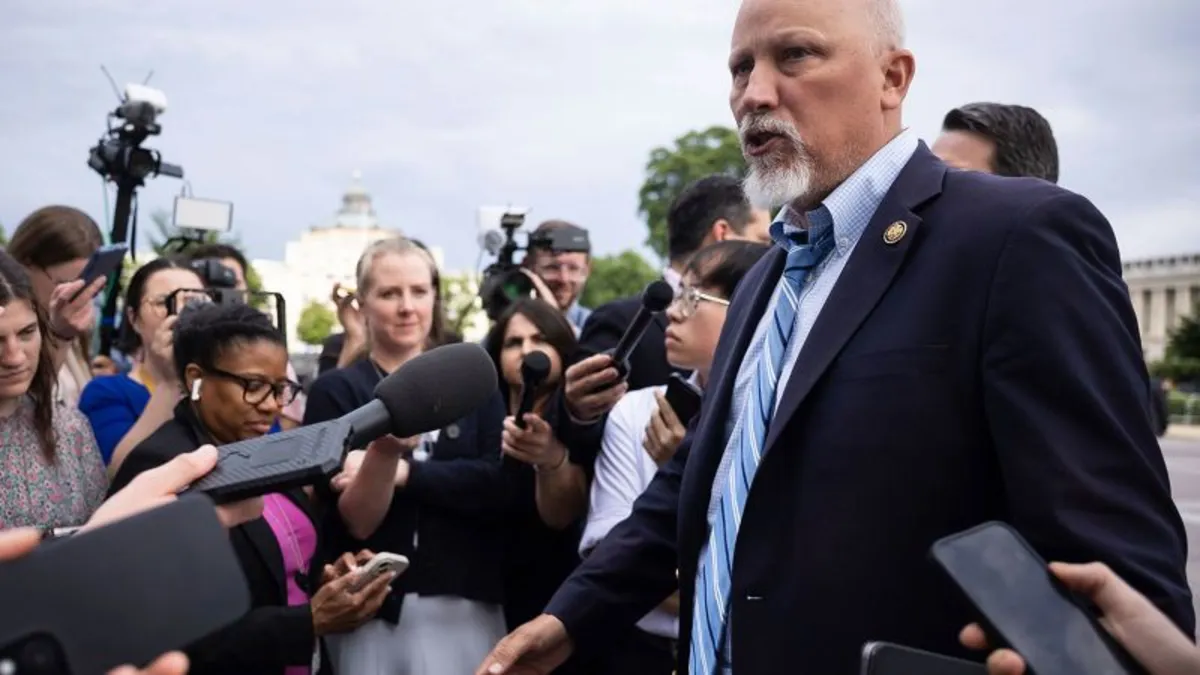
As President Donald Trump seeks to push his ambitious GOP agenda through a slender majority in the House, Representative Chip Roy stands out as a pivotal figure whose support is crucial yet challenging to secure. Despite the confidence of Speaker Mike Johnson and his team in passing Trump’s extensive reconciliation bill, they recognize that winning over Roy may prove to be one of their toughest battles.
Roy, known for his uncompromising stance on fiscal responsibility, has emerged as one of the few Republican lawmakers willing to openly challenge the president. His willingness to defy party expectations has even led to multiple threats of expulsion from his own party, including direct pressure from Trump. “Chip Roy has got courage,” remarked Representative Ralph Norman from South Carolina, who has collaborated with Roy to advocate for deeper cuts within the proposed legislation. Norman elaborated, saying, “A lot of them are more interested in coming back to Congress and doing whatever it takes to appease each little group.”
At 52, the quick-witted Texan has positioned himself as the de facto leader of a faction of GOP hardliners opposing Trump’s “megabill.” These conservatives have vowed to reject the proposal unless significant changes are made to mitigate the projected trillions of dollars in government debt. However, these modifications risk alienating Johnson’s more moderate members, some of whom are already threatening to withdraw their support unless the bill accommodates a higher cap on state and local SALT tax deductions.
While Trump’s primary concern appears to be the passage of the bill, Roy and his allies emphasize the importance of policy details and cost. They view this legislation as perhaps their best opportunity to significantly constrain the federal safety net, particularly concerning Medicaid, which they assert is on an unsustainable path. Behind closed doors, Roy has rallied fellow fiscal hawks, working diligently on amendments and advocating for changes to federal programs, even after Trump urged Congress not to “mess around” with Medicaid.
The bill is currently under consideration in the Rules Committee, which convened at 1 a.m. ET Wednesday. House GOP leaders are eager to expedite the legislation to a vote later that day. To defeat the bill, it would take just two GOP votes, in addition to Representative Thomas Massie of Kentucky, from Roy and his hardliner allies. Ahead of the marathon Rules meeting, Roy expressed cautious optimism, indicating that ongoing discussions between holdouts and leadership were yielding progress. “We’re in a better spot than we were even 48 hours ago, but there’s still a lot of things we’re ironing out,” Roy stated.
Despite this progress, as of Wednesday morning, GOP leaders had yet to present the final version of the bill reflecting the changes Roy has demanded. Even if the House manages to pass the bill with Roy’s support, he may face another round of negotiations if the Senate makes modifications. Insiders close to Roy suggest that he is genuinely trying to reach an agreement rather than taking a hardline stance from the outset.
Roy’s position has caused significant unrest among House Republicans. “Some guys just can’t take a win. There’s like 10 guys in our group that just cannot take a win. They want perfection,” said Representative Don Bacon, a moderate Republican from Nebraska. The tension has been palpable, with frustration growing over Roy’s steadfastness as some members believe it jeopardizes the overall party agenda.
Historically, Roy has been a thorn in Trump’s side, frequently attracting the president’s ire. Even before his congressional tenure began, he was vocal about his desire to challenge the increasing power of the executive branch. Since his election in 2019, Roy has made headlines by blocking legislation and openly criticizing Trump’s attempts to overturn the 2020 election results.
As negotiations continue, Roy finds himself in a delicate position. He has shown a willingness to support GOP leadership yet remains staunchly opposed to any legislation that does not substantively address deficit concerns. “What I do not believe in is making up numbers,” Roy emphasized in a recent floor speech, highlighting his commitment to fiscal integrity.
As the situation unfolds, the political landscape remains as volatile as ever. With the House divided and key votes hanging in the balance, all eyes are on Roy and his fellow fiscal hawks, whose decisions could significantly influence the trajectory of Trump’s legislative ambitions.